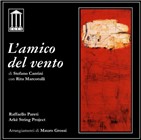Home » Jazz Articles » Album Review » Stefano Cantini with Rita Marcotulli: L'Amico del Vento
Stefano Cantini with Rita Marcotulli: L'Amico del Vento
While L'Amico del Vento is saxophonist Stefano Cantini's date—along with pianist Rita Marcotulli—it's equally Mauro Grossi's album. Grossi, a fine pianist in his own right, is the silent partner here, contributing arrangements to a recording that also features bassist Raffaelo Pareti and the Arké String Project. Arké's own album, Acquario (EGEA, 2004), looked farther afield to influences from the Middle East and the British Isles, along with its own Mediterranean concerns. Here these musicians' role is more supportive, but their presence defines the disc's overall ambience, creating rich counterpoint to Cantini's soprano on Pareti's up-tempo "Come Nei Film and softer, more elegant support on Grossi's through-composed tone poem, "Intermission.
Cantini—who shares composing duties with Marcotulli, Pareti, and Grossi—is the group's most overtly song-like writer. There's something inherently folksy about his almost naively lyrical title track and the equally soft and gentle "Flores. As an improviser he never strays far from singable melodies, and whether he's on soprano or tenor, his tone is warm and comforting. His writing veers dangerously close to the kinds of harmonic changes and melodies one might find in smooth jazz, but the all-acoustic nature of L'Amico del Vento and his subtle yet evident interplay with Marcotulli and Pareti help keep things honest.
Things never stray far from a delicate sound, but there are revealing moments of surprise scattered throughout. Marcotulli's solo feature, "Interludo, begins gently enough, alluding to the changes of the title track; but towards the end it breaks briefly into a tense passage where she layers cascading lines, contrasting vividly with Grossi's bittersweet ballad "Nando (Goes On).
But overall this is an easygoing affair that's meant to soothe rather than challenge. Parieti's "Waltz for Nana is one of two more referentially "jazz pieces on the session, with a gentle swing that's more implied than directly stated by Parieti and Marcotulli. Silvio Rodriguez's "Rabo de Nube, a duet with Marcotulli, best demonstrates Cantini's unfailing attention to the essence of a song, even while expanding it through improvisation.
Dave Brubeck's "In Your Own Sweet Way —another Cantini/Marcotulli duet—closes the album and, along with "Waltz for Nana, best demonstrates their appreciation of the jazz tradition on an album that makes a strong case for blending it with a suggestively impressionistic European approach. Evocative without being demanding, L'Amico del Vento succeeds in creating a warm and inviting place that manages to work on multiple levels.
Track Listing
L'Amico del Vento; Flores; Come Nei Film; Intermission; Interludo; Nanda (Goes On); Waltz for Nana; Rabo de Nube; La Grande Antenna; In Your Own Sweet Way.
Personnel
Stefano Cantini
saxophoneStefano Cantini: saxophone); Rita Marcotulli: piano; Raffaello Pareti: double-bass; Mauro Grossi: arrangements; Ark
Album information
Title: L'Amico Del Vento | Year Released: 2005 | Record Label: Egea Records
< Previous
Artie Butler: Have You Met Miss Jones?
Next >
The Good Life
Comments
About Stefano Cantini
Instrument: Saxophone
Related Articles | Concerts | Albums | Photos | Similar ToTags
For the Love of Jazz
 All About Jazz has been a pillar of jazz since 1995, championing it as an art form and, more importantly, supporting the musicians who create it. Our enduring commitment has made "AAJ" one of the most culturally important websites of its kind, read by hundreds of thousands of fans, musicians and industry figures every month.
All About Jazz has been a pillar of jazz since 1995, championing it as an art form and, more importantly, supporting the musicians who create it. Our enduring commitment has made "AAJ" one of the most culturally important websites of its kind, read by hundreds of thousands of fans, musicians and industry figures every month.



















